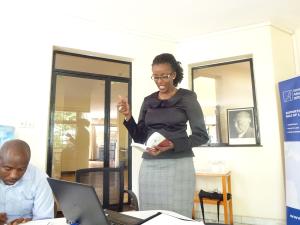Workshop on Community Land Law - Foundation Office Kenya
Workshop
Details
With the enactment of the community land law giving effect to Article 63(5) of the Constitution of Kenya 2010, it was widely anticipated that local communities would be more empowered to claim their communal land rights. However, this was not to be as the communities still remain unprotected with few gains being realized and multiple challenges still hindering the full realization of these rights under the newly enacted law.
The workshop on community land laws organized by Konrad Adenauer Stiftung (KAS) Kenya in partnership with Reconcile on 22nd and 23rd March 2017 was therefore convened as a response to this need. It brought together experts and stakeholders in the land sector in Kenya to deliberate on the land law regime and interrogate the Community Land Act 2016 with a view of identifying the gaps, highlighting the gains and proposing possible amendments to the law while also positioning them to contribute to the rules and regulations that are under development.
The workshop began by tracing the history of customary land rights in Kenya following its development through the colonial period, the independence period up to the promulgation of the Constitution of Kenya in 2010 and interrogating the constitutional imperatives for community land rights in Kenya by looking at Article 63(5) of the Constitution of Kenya 2010 and also examining the recently enacted Community Land Act 2016 highlighting its key provisions, gains and gaps and looking at the challenges that hinder its implementation.
The climax of the workshop is when all the participants agreed to have a discussion paper that highlights the discussions during the workshop on community land law outlining the key issues deliberated and finally enumerating the main recommendations made by the workshop. The following are recommendations proposed during the workshop;
1.Incorporation of the inclusivity and non-discrimination principle in the rules and regulations of the Community Land Act 2016 to protect women, persons with disabilities, and other special interest and marginalized groups and ensure their representation and participation on land issues at the community level.
2.Development of clear and well-defined rules, regulations and procedures of claiming and verifying communities’ interests and the community bundle of rights. The procedure of establishing community assemblies and the election of the community land management committees should also be clearly described with the roles of every institution involved being clearly outlined.
3.Initiation and scaling up of civic education initiatives to address the low level of awareness by communities on the process of claiming their community land rights. Where there are multiple stakeholders involved, there should be clear guidelines on the roles of every one of them.
4.Carrying out advocacy initiatives to ensure the operationalization and full implementation of the Community land law.
5.Development of guidelines to guide the establishment and updating of an inclusive register of community members and the election of community land management committee. These guidelines should ensure transparency, accountability, avoid elite capture and clearly specify the terms of office for elected officials while considering gender balance, documenting decisions making processes and geographical representation.
6.Broadening of the channels of communication to include local and vernacular mediums of communication for maximum reach to the community members.
7.Reviewing of land laws to incorporate customary communities living on public land deemed to be community land. This should be done by developing guidelines for securing tenure rights in informal settlements and thus addressing the question of lack of clarity and procedure for explicitly dealing with slums on public land, ancestral lands in urban areas and customary communities in public land.
8.Clarification of the justifying clause for the conversion of communal land to public land in order to render full and clear meaning to the term ‘public purpose’.
9.Advocating for the cost of adjudication to be affordable for communities and also pursuing the possibility of waiving the cost through exemption of community members from paying adjudication costs as well as exemption from taxation.
10.Consideration of future amendments to the Community Land Act to have definitions of legal and technical terms. This can also be done through defining the terms in the rules and regulation of the act.
11.Customization of the STDM database to address the structure of the community land register and annual updates.



